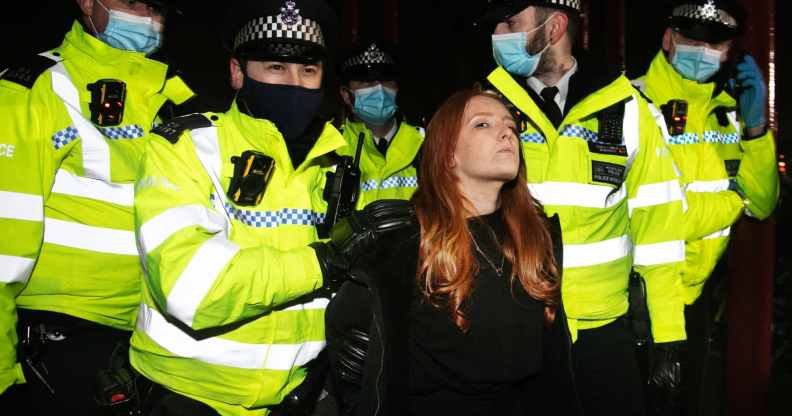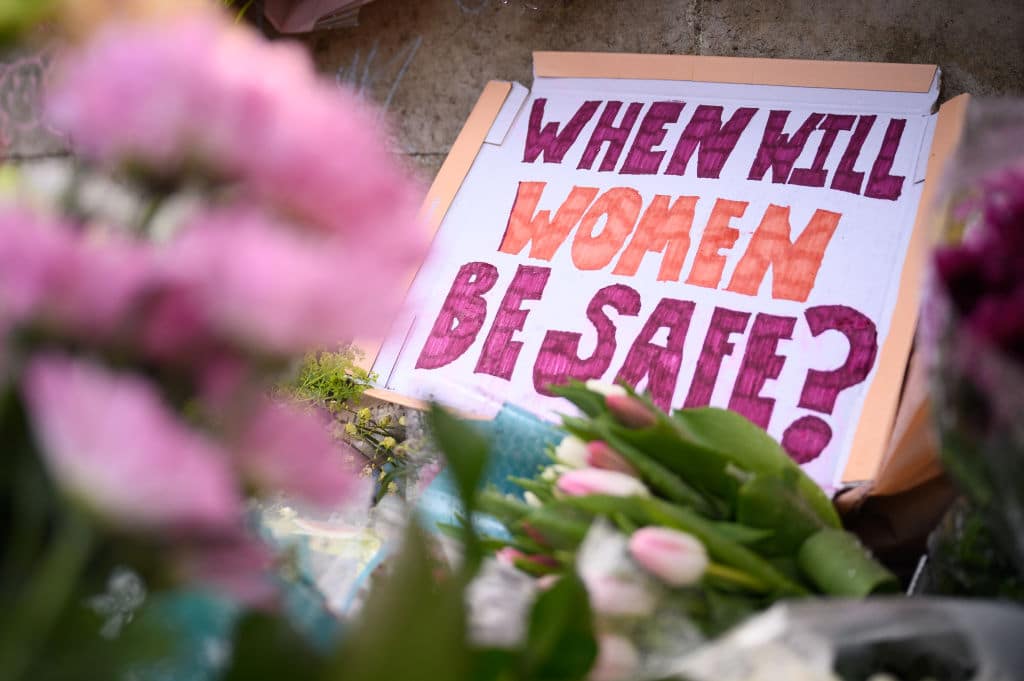Met Police pays ‘substantial’ damages to women arrested at Sarah Everard vigil

Patsy Stevenson is detained by Met police at a peaceful vigil for Sarah Everard on Clapham Common (Kristian Buus/In Pictures/ Getty)
London’s Metropolitan Police has paid “substantial” damages to two women who were arrested during a vigil for Sarah Everard.
Patsy Stevenson and Dania Al-Obeid were detained at the vigil on Clapham Common in March 2021, which was held during Covid-29 restrictions.
The vigil was attended by hundreds who paid their respects to Everard, who was kidnapped, raped and murdered by serving Met police officer Wayne Couzens.
The event was originally planned by Reclaim These Streets (RTS), but the campaign group was forced to cancel after the Met threatened organisers with £10,000 fines under the lockdown rules in place at the time.
However, members of the public attended the vigil throughout the day with no police action for around six hours, before clashes took place in the evening.
Images of Stevenson being handcuffed, pushed to the ground and dragged from the vigil by officers quickly went viral and the Met faced scrutiny for its heavy-handed approach to policing the event. The controversy, in the wake of Everard’s murder, saw women’s confidence in the force plummet.
The law firm representing the two women said “substantial” damages had been paid to them, following a climbdown by the Met after a two year legal battle over the arrests.
“It has taken over two years to reach this conclusion,” Stevenson said, as quoted by Sky News.
“It’s been a really tiring and difficult process but it has felt important to push for some form of accountability and justice for myself and all women who attended the vigil to express our anger and grief over the murder of Sarah Everard by a serving Metropolitan Police officer.”

Al-Obeid said, as a domestic abuse survivor, she found “this journey incredibly difficult” but “very important” as someone who “has been failed by the police in that context”.
“I appreciate that the Met Police have acknowledged our motivations for attending it but ‘badly let down’ is an understatement,” she stated.
“I have felt abused, abandoned by the police prior to, during and post the vigil – I do not feel protected or safe with any police force.”
Speaking with BBC Radio 4 Live, Stevenson said she does not believe the Met has learned from what happened at the Everard vigil.
“I think it will always be lip service,” she said, “I think Mark Rowley is better at lip service than Cressida Dick was, he is doing things in a more tactical way.
“Time and time again we see an incident happen, the police do a lot of PR damage – like they did with the vigil – ‘oh they were violent, they did this they did that’, then they get a new commissioner, ‘radical reform’ – where is this reform?”
In letters to both women, commander Karen Findlay wrote that she fully acknowledges the pair’s motivations for attending the vigil.
“The policing plan for the vigil was devised to provide an opportunity for members of the public to attend in order to express their grief and anger,” she wrote.
“Acknowledging that the fundamental right to protest remained, the circumstances at the time of the vigil – namely that we were in the midst of the COVID-19 pandemic – presented an extremely difficult challenge for policing and the officers present due to the need to balance the potential risk such a gathering could pose to public health.”
She continued: “That aside, I appreciate the anger, frustration and alarm your arrest undoubtedly caused you, exacerbated by the subsequent proceedings, and I regret that your opportunity to express your grief and anger was curtailed by your arrest and removal.”
In a statement the women’s solicitor, Rachel Harger, said: “I am glad that the Met have finally acknowledged that those who attended the vigil had the fundamental right to protest the murder of Sarah Everard by a serving Met officer.
“Protests are as vital as they have ever been, without them, injustices will be unchallenged and people will lose confidence in democratic processes by which things can change.”

